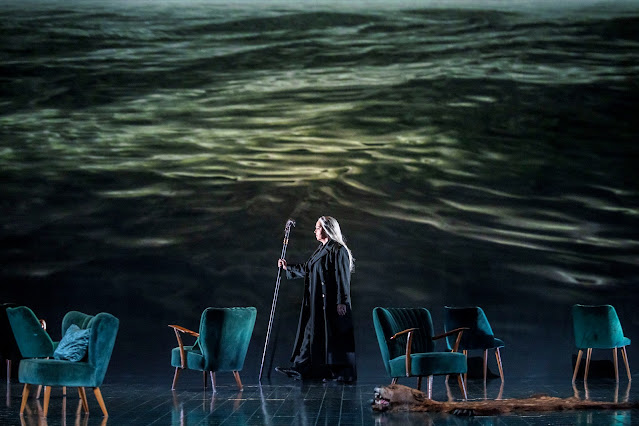By Joshua D. Gailey
 |
|
The homoerotic undertones highlighted by Alcina’s cross-dressing plot has made the opera a favorite among queer opera fans. © James Glossop / Opera North. |
On Alcina’s magic island, nothing is certain; feelings are fickle, ex-lovers are transformed into beasts, and the island itself is but an illusion. Even gender is unstable: the opera’s intricate story features a woman disguising herself as a man to rescue her fiancé—a role that was written for a castrato, commonly performed by a mezzo-soprano, and played in our production by a countertenor. To top it all off, our production gender-swaps a character, Melissa, to match her gender in the source text, Ludovico Ariosto’s Orlando furioso. Although cross-dressing was a common attribute of 17th- and 18th-century opera seria, the level of gender play in Alcina is nonetheless striking for modern audiences, and has even led some viewers to regard Handel as the “queerest of opera composers.”
For countertenor Randall Scotting, who plays Ruggiero, Baroque opera’s gender flexibility starts with the castrato. “If you look at it historically, there is just inherently this gender play in Baroque opera. Some castrati performed as female characters throughout their careers, because they were just so good at it. And in the other direction, Handel often wrote male characters for female singers. It just was very flexible.”The early modern period (roughly 1450–1800) had a fundamentally different understanding of gender than we do today. Early modern Europeans did not conceive of gender as a binary, but rather as a vertical hierarchical continuum, with adult masculinity at the top. Because castrati did not go through puberty and their progression along this ladder was halted, says Scotting, “they embodied a truthful whole of all genders, which made them believable in male or female roles on stage.”
Gender was thus divorced from voice type, a fact that can still elicit surprise from modern audiences. “People expect a certain sound to come out of my mouth—a sort of hefty baritone that would match my looks,” says Scotting, who frequently sings roles written for castrati. “But when I start to sing, I get a sense from an audience when what they’re seeing visually doesn’t match what they’re hearing. I think my sound does match. I have a strong, muscular countertenor sound, which I think does match my visual appearance. But it’s not what people expect.”
 |
|
Countertenor Randall
Scotting, who plays Ruggiero in our production of Alcina, pictured here
in 2021’s Flight. |
Because male characters on the Baroque opera stage regularly sang in the same vocal range as women, it would have been perfectly convincing for 18th-century audiences when Bradamante disguises herself as a man. In modern revivals, the intermingling of vocal range also allows for flexible casting; it is common these days to see Ruggiero played both by mezzo-sopranos and by countertenors. But for our conductor, Christine Brandes, the choice to cast a man or a woman as Ruggiero is ultimately not as important as the energy the singer brings to the role. “What is the nature of that energy, and how persuasive is it? Are you sexy or not? I think that multi-faceted nature of desire is the reason for gender-bending’s longevity in opera.”
Attitudes like Brandes’s are possible because conceptions of gender and sexuality have evolved in recent decades. For John Marzano, who plays Oronte and who maintains an active career as a drag queen, opera’s long history of gender fluidity is a useful reminder that gender isn’t fixed: “I think it’s important for contemporary audiences to see our fluid understanding of gender play out in something that isn’t new. Alcina was written so long ago and was performed like this so long ago—I think that’s important for people to see.”
 |
| Claire Pascoe as Melissa in Opera North's production of Alcina. © James Glossop / Opera North. |
What about the gender-swapped character Melissa, which is unique to our production? When Handel wrote Alcina, he changed Ariosto’s Melissa into Melisso, simply because he needed a role for a bass to balance the opera’s musical forces. (He also had a bass, Gustavus Waltz, working for him that season.) But stage director Tim Albery was interested in the way Ariosto’s story positioned Melissa as a foil to Alcina. Although Melissa is a minor role, Albery suggests Melissa may play a larger part in the opera’s story, hinting through staging and costuming that Melissa is really in control here.
Musically, it’s a rather minor change. Originally written for a bass and performed by a man, Melissa’s one aria is performed up an octave to fit mezzo-soprano Nina Yoshida Nelsen’s voice. And without a bass in the opera’s choruses, the music staff has made some clever changes to the score to make sure all the parts are covered.
As for the impact on the opera’s gender politics, that’s up for the audience to decide. “The beauty of art is that everybody has the opportunity to grab onto whatever resonates with them,” says Nelsen. “I think there’s something really exciting about that. Art has the ability to touch human beings in all sorts of ways.” As with Bradamante’s cross-dressing and Ruggiero’s casting, the ultimate goal, then as now, is to provoke strong emotions. You may be surprised by where your desires take you.




No comments:
Post a Comment